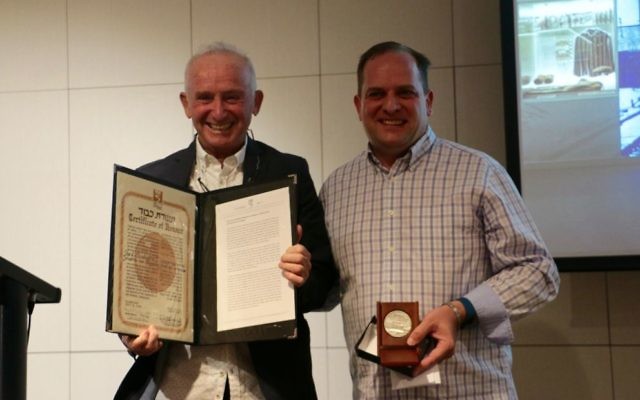‘We can never remain silent’
“To speak about Auschwitz isn’t easy and it never will be easy,” said Holocaust survivor Olga Horak in her testimony. “Our generation was betrayed by mankind."

TEARS and standing ovations abounded on Sunday as almost 200 people packed the Sydney Jewish Museum to commemorate the 72nd anniversary of the liberation of Auschwitz-Birkenau on UN International Holocaust Remembrance Day.
“To speak about Auschwitz isn’t easy and it never will be easy,” said Holocaust survivor Olga Horak in her testimony. “Our generation was betrayed by mankind … No language has words to describe Auschwitz. It was the bottom of hell. Living was worse than dying and survivors will live in a cloud of inner pain forever.”
Horak told The AJN, “I’ve been speaking at the museum for 27 years. It’s not easy to find the right words, but I feel compelled to speak. While I can still do it, I will do it.”
Congratulating Horak on her speech was director of the UN Information Centre for Australia, New Zealand and South Pacific Christopher Woodthorpe, who delivered a message from UN Secretary-General Antonio Guterres.
“We must place education at the centre of all efforts to stop -anti-Semitism and discrimination,” he said. “Irrationality and intolerance are back. We can never remain silent when human beings are suffering.”
Delivering the keynote address was member for Berowra Julian Leeser, whose grandmother escaped Germany in 1936.
“It is our privilege to know and listen to Holocaust survivors,” Leeser said. “We have met, heard, seen and loved them. And it will be our job to keep their memory alive for the next generation.”
He added that he will fight to keep Holocaust education on the school curriculum, especially in light of an increase in Holocaust denial, and the political and economic conditions in the world today.
“The Holocaust didn’t happen overnight, and it can happen anytime, any place, to anyone,” Leeser cautioned. “While we are not necessarily heading towards a new Shoah, there is definitely a gathering storm.”
Shortly afterwards, Israeli ambassador Shmuel Ben-Shmuel took to the podium to award two Righteous Among the Nations medals.
“In a world of total moral collapse, there were a small few who cared about people around them,” Ben-Shmuel said. “They stood in stark contrast to the hostility and indifference during the Holocaust. While six million Jews perished, thousands were saved by the courageous intervention of non-Jews.”
The medals were awarded posthumously to Ids and Elizabeth Joustra, who adopted a month-old Jewish baby named Alter Heimann, who was left at an Amsterdam train station in 1943 and was subsequently rescued by Dutch resistance fighter Mia van Seggelen-Smit. The Joustras changed his name to Maarten and hid him for the rest of the war before emigrating to Australia in 1951.
Now aged 74, Maarten Joustra and his nephew Kyle accepted the medals on behalf of his late adoptive parents.
“It was my lucky day,” Maarten Joustra said of the day he was rescued. “There are no words to describe how grateful I am to those three people [Ids and Elizabeth Joustra and van Seggelen-Smit]. Thanks to them, I have always known who I am. They are so deserving of this award.”
Concluding the commemoration was Rachel Flitman, who touched on the importance of passing the legacy of the Holocaust onto the third generation.
“We exist because of our grandparents’ survival,” she said. “We can never take the place of the survivors, but we will be the mindful custodians of their stories.”
YAEL BRENDER

comments